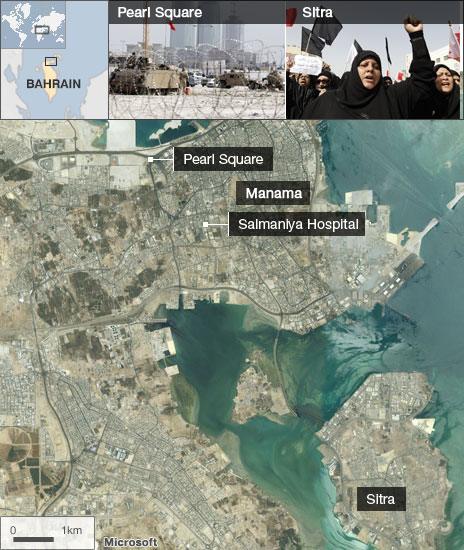Bahrain protests: Angry mourners bury clashes victims
- Published
Bahrain protesters: "We shall never accept humiliation"
Thousands of people have been voicing anger against Bahrain's authorities at the funerals of victims of Thursday's clashes which left four dead.
Crowds attending Friday prayers joined the funeral processions, calling for the overthrow of the ruling family.
At the prayers a Shia cleric described the clashes as a "massacre", saying the government had shut the door to talks.
Later, gunfire was heard in the centre of Manama, though it was unclear where it came from.
Witnesses told the BBC that five ambulances had arrived at the scene, but there were no details of injuries.
Unconfirmed reports from the Associated Press said security forces had fired tear gas at protesters.
Government supporters have also held a rally in Manama.
After prayers in the Grand Mosque, demonstrators with Bahraini flags and portraits of the king staged their own march protected by security forces.
Correspondents said the rally attracted many non-native Bahrainis, including Sunni Muslims from other Gulf states and South Asia.
The BBC's Caroline Hawley in Manama described it as a luxury-car protest, saying people were turning up in Humvees and Mercedes cars, honking their horns.
Tanks have been stationed at strategic points around the streets of Manama, a day after demonstrators were cleared from the central Pearl Square.
Soldiers would take every measure necessary to preserve security, the interior ministry said.
Bahrain is ruled by a royal family and a Sunni Muslim elite, but has a Shia majority who make up the bulk of the protesters.
The country's most senior Shia cleric, Sheikh Issa Qassem, described attacks on protesters as a "massacre" and said the government had shut the door to dialogue.
As he spoke at emotionally charged Friday prayers in the Duraz neighbourhood, supporters shouted "victory for Islam", "death for Al Khalifa [the ruling family]" and "we are your soldiers".
Western countries have urged Bahrain to show restraint in dealing with protesters and called for meaningful reform in the small Gulf state kingdom.
France announced on Friday it had suspended exports of security equipment bound for Bahrain and Libya, where protests have also been suppressed by the authorities.
Pro-democracy protests have recently swept through several Arab nations, with the presidents of Tunisia and Egypt forced to resign amid growing unrest.
'Justice and freedom'
The funerals of two men, one in his 50s the other in his 20s, were held in the village of Sitra.
The two coffins were draped in red-and-white Bahraini flags and placed on top of all-terrain vehicles, which then drove slowly through the streets.
"Trial, trial for the criminal gang," the crowd shouted, and: "Justice, freedom and constitutional monarchy."
Some are now calling for the removal of the royal family.
"We used to demand for the prime minister to step down, but now our demand is for the ruling family to get out," Ahmed Makki Abu Taki, the brother of one of the victims, told Reuters news agency.
Men attending the ceremonies said they were willing to sacrifice their lives for change, as women dressed from head to toe in black chanted: "Revolution till victory."
A third funeral was held in the village of Karzakan.
Many more protesters joined the processions after Friday prayers.
Our correspondent says the situation is calm but tense, with helicopters overhead the only security presence, and the crucial question is how the security forces respond to the large numbers of protesters.
Since independence from the UK in 1971, tensions between the Sunni elite and the less affluent Shia have frequently caused civil unrest. Shia groups say they are marginalised, subject to unfair laws and repressed.
Washington is watching with growing concern as unrest and violence spread across the Middle East, threatening its regional interests, correspondents say.
While Bahrain is tiny, with a population of less than one million, it is home to the US Navy's Fifth Fleet and is near another key US ally in the region, Saudi Arabia.
